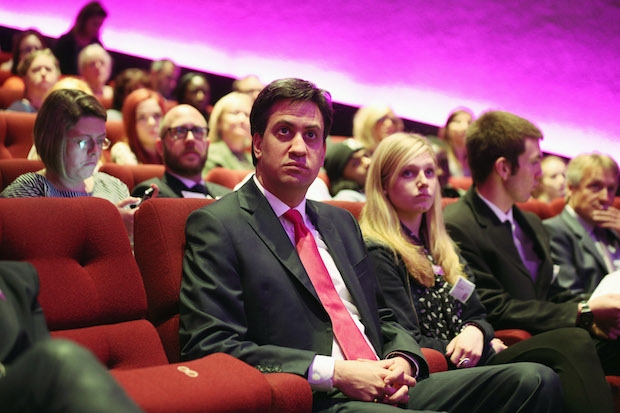If a bus driver were heading towards the edge of a cliff, the passengers would try to seize control of the wheel in all cases except one. Members of the Parliamentary Labour Party would sit back in their seats, put on their most confident smiles, and tell each other they were going full-speed ahead in the right direction.
Ed Miliband is leading the Labour Party to disaster. His latest approval ratings are almost as bad as Nick Clegg’s – which is not company any of us want to keep. Voters see him as an insipid waffler, too weak to stand up to foreign rulers or the trade unions.
Yet barring a fatal accident under the wheels of another runaway bus, or a religious revelation that pushes him into monastic retreat, Labour will allow Ed Miliband to lead it into the next election; just as it allowed the equally unpopular Gordon Brown to lead it to defeat in 2010; just as the Liberal Democrats will allow Nick Clegg to continue to lead them, however close to zero their opinion poll ratings fall.
Why do politicians, who are meant to be ruthless in pursuit of their own interests, put their futures in the hands of losers?
The saloon-bar reflex is to harrumph that no private company would allow a discredited chief executive to remain in post , and damn the Labour party’s suicidal complacency. But, as so often, the saloon-bar wisdom is wrong. Shareholders and employees have always allowed executives to destroy businesses. Never forget that hardly anyone in the British finance tried to stop the bankers of the last decade. The few who did were fired. My friend, the economist Chris Dillow, once wrote:
‘For all their talk about flexibility, firms – especially large ones – are quite inflexible. Companies, like societies, can be trapped by their own history. The death rate among even large firms is high. One hundred years ago, Armstrong Whitworth, Bleachers Association and Brown & Co were among the UK’s biggest firms. No-one’s heard of them today.’
Ed Miliband and Fred Goodwin may not appear to have much in common, but they both lead or led large hierarchical organisations, and had or have the power to quash dissent.
Not that they need to use it too often. Inertia – the tendency to resist change and avoid unpleasant confrontations – is their truest friend. Nowhere more so than in the Labour Party. ‘The will to powerlessness grips it,’ one source told me. Its MPs are world leaders in finding 1001 reasons for doing nothing at all.
I started by saying that Miliband was a disaster, and by most standards he is. But look at it from the perspective of a nervous Labour MP, who knows that divided parties rarely win elections. Miliband has had surprising successes. The Royal Air Force will not defend the Kurds of Kobane today because Miliband will not tolerate action on Syrian territory against either the mass murderers of Islamic State on the equally barbaric forces of Bashar Assad. When he first stopped action against Assad, I wrote:
‘[Miliband] announced his anti-fascist pedigree by saying that his parents were “two young people [who] fled the darkness that had engulfed the Jews across Europe” to find “the light of liberty in Britain”. As a politician whose grandfather had been murdered in a Nazi death camp, he would oppose crimes against humanity.
‘Miliband Minor will never be able to use the Holocaust again. As things stand, he is willing to speak out against the gassing of Jews with Zyklon B 70 years ago. But when he is called on to speak against the gassing of Syrians with vaporised sarin in the here and now, when what we say and do could make a difference, the anger vanishes, and with Miliband – as with Hamlet – “the native hue of resolution is sicklied o’er with the pale cast of thought”.’
‘That’s the end of his career in the Shoah business,’ I thought as I typed. How wrong I was. Hardly anyone on the Left has commented on Miliband’s grotesquely Pecksniffian double-standards. Hardly anyone else has noticed that he has an effective veto over British foreign policy, which Cameron dare not challenge. Quite an achievement for a supposedly hopeless leader of the opposition.
If you are a member of the shadow cabinet gulping down the single malt between your howls of despair, the thought that he could still win may also comfort you. We are about to have an election in which the first past the system will go haywire. It was not designed for four-party or in some seats five-party politics. Candidates will win with 26 per cent or 27 per cent of the vote. The Electoral Reform society predicts that many MPs in 2015 will be the beneficiaries of “almost random victories”.
In these circumstances, Miliband’s attempt to get Labour’s core vote out and forget about the rest of the electorate may work. At 35 per cent, it is larger than the Tory core of 33 per cent, and better distributed in winnable seats. Conservatives hope for an improvement in their fortunes, naturally. They do not yet realise how deeply they are hated. Millions of people will vote for anyone who isn’t a Tory.
Fair enough, you might say, but why not why not help the coalition on its way by running with a popular candidate? To which Labour insiders reply: that question is 18 months out of date. If Labour had decided Miliband was not good enough, rivals should have moved against him in 2013, and given themselves time to introduce themselves to the electorate. A leadership election now would take two months to organise, and, with Christmas coming, probably would not happen until January. The general election will all but be upon us by then.
In any case, who is the alternative candidate and what is his or her alternative programme? No national figure is waiting in the wings to take over. No one has harried Miliband, and built up his or her band of supporters. David Miliband is gone. Alan Johnson and Alastair Darling are out of Westminster politics and are probably too old. Yvette Cooper, Andy Burnham and Chuka Umunna aren’t well enough known. The Blairites, who for all their faults actually won elections, have vanished. No, no, no, insiders say to me. It’s too late. There’s no candidate. There’s no programme. All a challenge would do is divide the party at the worst possible time. In any case, they continue, the Labour Party is just too nice to assassinate its leaders. There’s nothing else to do but go over the cliff, then see where we all are after we have smashed into the beach.
If somehow Labour scrapes a victory, I will accept that success is its own vindication, while wondering how a government with so little popular support can rule.
But let me warn those MPs who have bitten their tongues and muffled their doubts, that a reckoning will follow another Tory-led government. A second Cameron administration will tear itself and the country apart over Europe; it will reignite Scottish nationalism; and make millions suffer as it tries to tackle the deficit it forgot to eliminate in this Parliament. For the second general election a row, Labour politicians will have been the Tories’ best friend, and failed to prevent a manifestly inadequate leader leading them to defeat.
Doing nothing can on occasion be a sensible strategy, but there are times when it is culpable negligence.







Comments